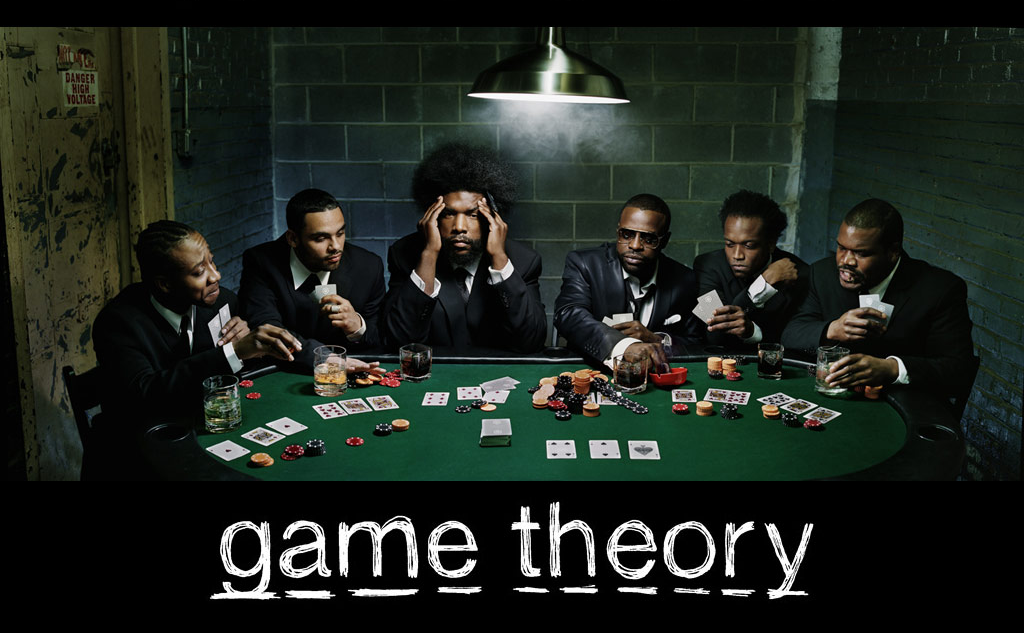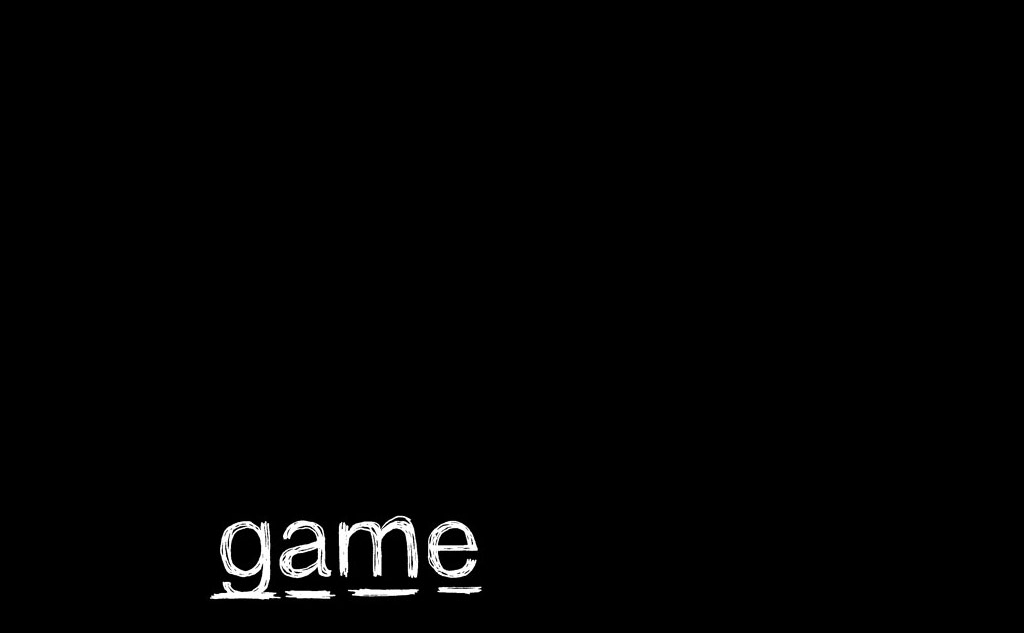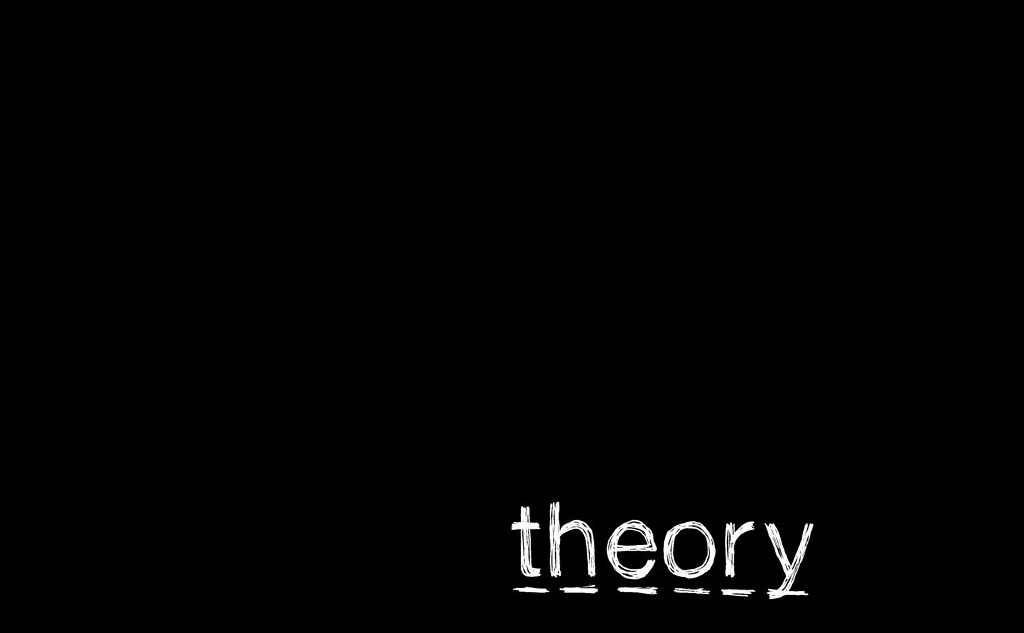Click here and press the right key for the next slide.
(This may not work on mobile or ipad. You can try using chrome or firefox, but even that may fail. Sorry.)
also ...
Press the left key to go backwards (or swipe right)
Press n to toggle whether notes are shown (or add '?notes' to the url before the #)
Press m or double tap to slide thumbnails (menu)
Press ? at any time to show the keyboard shortcuts
Game Theory Introduction



The Roots, 2006
A game is ‘any interaction between agents that is governed by a set of rules specifying the possible moves for each participant and a set of outcomes for each possible combination of moves’ (Hargreaves-Heap & Varoufakis, 2004, p. 3)
1 application: describe behaviour in social interactions
When two or more agents interact,
so that which outcome one agent’s choice brings about depends on how another chooses,
how do their preferences guide their choices?
first the representation
| me | |||
| put £10 in box A | put £10 in box B | ||
| you | open box A | £10 £0 | £0 £0 |
| open box B | £0 £0 | £10 £0 | |
| me | |||
| put £10 in box A | put £10 in box B | ||
| you | open box A | £8 £2 | £0 £0 |
| open box B | -£2 £2 | £10 £0 | |
How you act
is a function of two things:
your preferences
and your beliefs about how others will act.
| me | |||
| put £10 in box A | put £10 in box B | ||
| you | open box A | £8 £2 | £0 £0 |
| open box B | -£2 £2 | £10 £0 | |
Game theory builds on decision theory
preferences
To exhibit instrumental rationality is to select those actions which you expect to best satisfy your preferences.
| me | |||
| put £10 in box A | put £10 in box B | ||
| you | open box A | £8 £2 | £0 £0 |
| open box B | -£2 £2 | £10 £0 | |

Why study game theory and its limits?
‘game theory is the most important and useful tool in the analyst's kit whenever she confronts situations in which
what counts as one agent's best action (for her)
depends on
expectations about what one or more other agents will do,
and
what counts as their best actions (for them) similarly
depend on
expectations about her’
(Ross, 2018).
| me | |||
| put £10 in box A | put £10 in box B | ||
| you | open box A | £8 £2 | £0 £0 |
| open box B | -£2 £2 | £10 £0 | |
terminology: dominance
Why study game theory and its limits?
‘game theory is the most important and useful tool in the analyst's kit whenever she confronts situations in which
what counts as one agent's best action (for her)
depends on
expectations about what one or more other agents will do,
and
what counts as their best actions (for them) similarly
depend on
expectations about her’
(Ross, 2018).
| Gangster X | |||
| stay home | attack | ||
| Gangster Y | stay home | 2 2 | 1 3 |
| attack | 3 1 | 0 0 | |
Why not simply decision theory?
Why not simply decision theory?
How you act
is a function of two things:
your preferences
and your beliefs about how others will act.
Your beliefs about how others will act
are a function of your knowledge of two things:
your beliefs about their preferences
and your beliefs about how they believe others will act.
Your beliefs about how they believe others will act ...
decision theory
game theory
application 1: describe how people act
How do rational agents decide which of several available actions to perform?
When two or more agents interact,
so that which outcome one agent’s choice brings about depends on how another chooses,
how do their preferences guide their choices?
caveat: they are just models
Why not simply decision theory?
How you act
is a function of two things:
your preferences
and your beliefs about how others will act.
Your beliefs about how others will act
are a function of your knowledge of two things:
your beliefs about their preferences
and your beliefs about how they believe others will act.
Your beliefs about how they believe others will act ...
Why study game theory and its limits? (ctd)
‘we treat game theory not as a branch of mathematics but as a social science whose aim is to understand the behavior of interacting decision-makers’
(Osborne & Rubinstein, 1994, p. 2; compare Dixit, Skeath, & Reiley, 2014, pp. 36--7)
‘understanding why game theory does not, in the end, constitute the science of society (even though it comes close) is terribly important in understanding the nature and complexity of social processes’
(Hargreaves-Heap & Varoufakis, 2004, p. 3)
short essay question:
What is team reasoning?
Which, if any, social interactions are better modeled by team reasoning than game theory?
plan
1. What is game theory? ✓
2. What are some limits on its applications? ✓
3. What is team reasoning and how might it overcome the limits? ✓